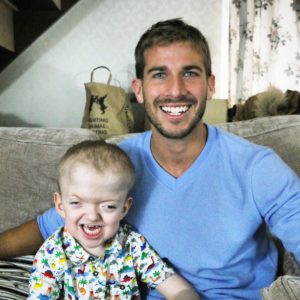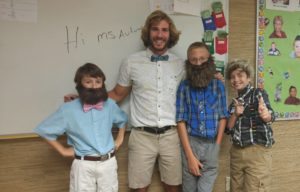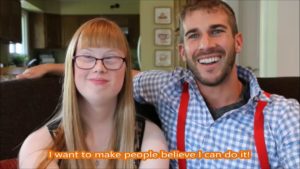
“Mr. Chris” with Leo, who has Pfeiffer Syndrome
As I scrolled through Instagram’s ‘explore’ feature earlier this year, I stumbled across a very special video. In it, a young child with special needs was being interviewed. The questions ranged from what he would like people to say when they meet him to what is the best part about being him. I was intrigued, and with a little more research, discovered that the entire account, called Special Books by Special Kids, is dedicated to interviewing kids and adults with various diagnoses. I loved this idea, and followed the page right away. As amazing as it is to watch a new interview every week, I was even more amazed by the story behind the interviewer and his movement.
Christopher Ulmer, or “Mr. Chris” as he’s known to those he meets, started Special Books for Special Kids (SBSK) after becoming a special education teacher. He wanted his students and their families to be able to share their stories with the world, and planned on doing so by creating a book. The original idea was to have a chapter for each of Ulmer’s eight students, chronicling their successes and struggles. But, after having his idea rejected by 50 publishers, Ulmer had to come up with a new plan. So, he set out to complete the project on his own, starting a Facebook page. Currently, the page is just shy of two million followers. Ulmer’s Facebook campaign led to the creation of an Instagram account, Twitter account, and recently, a YouTube channel.

Ulmer with his students (in costumes impersonating him!)
Ulmer didn’t start his professional life with special education in mind. He graduated from Penn State with a degree in communications and a dream of coaching college soccer. While coaching for a small college, he was offered a free Master’s in Education. He picked special education for his specialty on a whim, never thinking he’d use it. But, he fell in love with the profession during his time student teaching. He incorporated song into the classroom’s schedule and started each day by giving ten minutes of compliments to his students to boost their confidence and help them come out of their shells. After working closely with his students for a couple of years, he realized that others wouldn’t understand them the way he did – he had formed his special connection with them over a long period of time. So, he set out to bring his students and others like them closer to the rest of the world, interviewing “those with a diagnosis”.
Ulmer now travels all over the world, interviewing people of all ages with all sorts of diagnoses. He says the purpose is to connect diagnosed individuals with the rest of the world, and to show the true extent of human diversity. On the SBSK website, it states one of the main missions as thus: “We connect societies around the world, building a global dialogue around neurodiversity.” Ulmer puts it simply, “My only motive is to make the world a slightly better place… You can get to know how to connect with someone who has a condition, because throughout your life you’re going to encounter individuals with all types of brains.”

Ulmer with Kelly, a young entrepreneur
From watching these interviews for the past year, a theme has emerged. Ulmer’s questions poke at something that these children, their families, and their friends know, and something that we should all inherently realize. All people, no matter their differences, whatever their faults and strengths are, are human, and are deserving of love and acceptance. It shouldn’t be hard to ask for this, but it seems the world has forgotten how to love. SBSK is the perfect reminder.
I really enjoyed reading about this advocates journey and his exceptional efforts in trying to inform the world about neurodiversity. By implementing songs and compliments in the classroom, definitely allows the kids to be more confident and be comfortable when outside their comfort zones. Despite the rejection of his first attempt at spreading neurodiversity, he was able to create something bigger and more accessible which now reaches all over the world. I really enjoyed listening to one of his student’s sing “Ho Hey” by The Lumineers and seeing how their interactions are not a student-teacher dynamic but just friends having a good time. I think by sharing many neurodiverse individual’s stories will help the world understand and accept these unique individuals for who they are and not for their diagnoses.